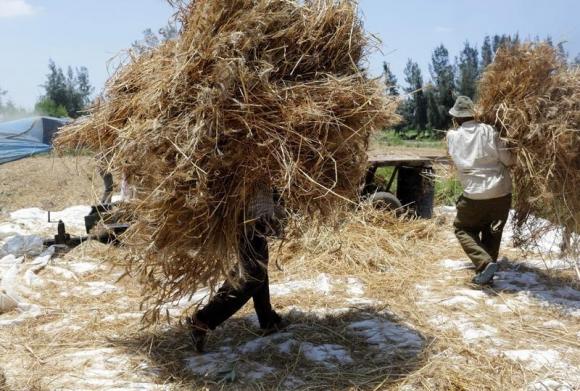 eat buyer Egypt could remove the premium price the government pays to local farmers for their grain in a bid to claw back millions of dollars lost annually on fraudulent sales of cheap foreign wheat - passed off as local crop.
eat buyer Egypt could remove the premium price the government pays to local farmers for their grain in a bid to claw back millions of dollars lost annually on fraudulent sales of cheap foreign wheat - passed off as local crop.Egypt pays domestic farmers over $100 per ton above the world market price for their wheat to encourage sales to the state, but this has also enabled profiteers, with proceeds split between importers, farmers and others along the supply chain.
Supplies Minister Khaled Hanafi told Reuters the government is examining changes to the local wheat purchasing system to "give the farmers the same subsidy in a different way to avoid the distortion in the market."
Egypt bought 3.7 million tonnes of local wheat in the 2013/2014 season that ended last week, the Supplies Ministry said on Tuesday, a figure on par with the amount of domestic wheat purchased by the state last year.
Two Cairo-based traders told Reuters they expected the state had purchased at least 500,000 tonnes of foreign wheat disguised as domestic during this year's local purchasing season. This compares to estimates around 400,000 tonnes last season.
"It is something that happens every year and in one year the amount even reached 800,000 tonnes. The government is aware it is happening," one government source, who declined to be named, told Reuters.
The government has steadily increased the fixed price it pays for local wheat in recent years. This year it raised it to 420 pounds ($58.74) per ardeb (150 kg) from 400 pounds.
Nomani Nomani, an adviser to the minister, said the problem will persist as long as the government keeps offering farmers an artificially high price.
Both Nomani and Hanafi said subsidizing the farmer directly would be a more effective way of boosting local purchases without the risk of being tricked by fraudsters.
OFFER MARKET PRICE
Instead of giving farmers higher prices for their wheat, Nomani said he has proposed to the minister offering farmers market prices while paying more subsidies for fertilisers and seeds as one idea.
"This price difference at the end of the day is like a form of subsidy to the farmer," Nomani said.
"There are a lot of ways in which we can support the wheat farmer other than give him higher prices for the wheat."
Egypt wants to buy more of its domestic crop in order to cut back on wheat imports that drain billions of dollars from state coffers, a strain the cash-strapped government can scarcely afford amid sluggish growth and a wide budget deficit.
The country's food import bill amounted to 32 billion Egyptian pounds ($4.48 billion) in the current financial year that ends June 30.
One of the traders said that before the local harvest finished, traders in the breadbasket region of the Delta began planning to secure inexpensive stocks of wheat from Black Sea exporters, whose harvest that begins this month.
Although the wheat will not be shipped until late July, the traders can cut deals to deliver imported wheat to open-air storage facilities known as "shewan" even after the government's purchasing season has ended because the transfer of wheat from those facilities to flour mills will continue until November.
Another Cairo trader said he expected there was less of an incentive for profiteers to sell foreign wheat disguised as local to the government this year given the Egyptian pound was weaker through this year's harvest than last year's.
"The profit margin would be less," he said, estimating that only 300,000 to 400,000 of the total state purchases of domestic wheat was actually imported.





